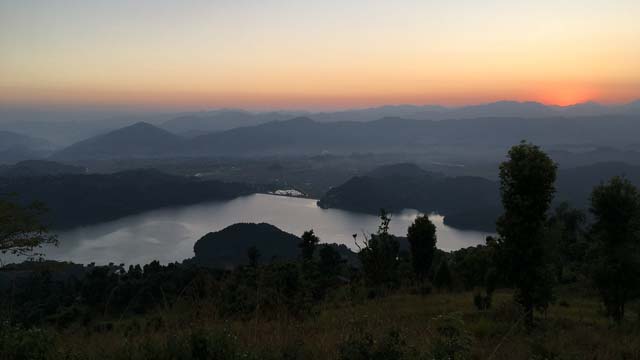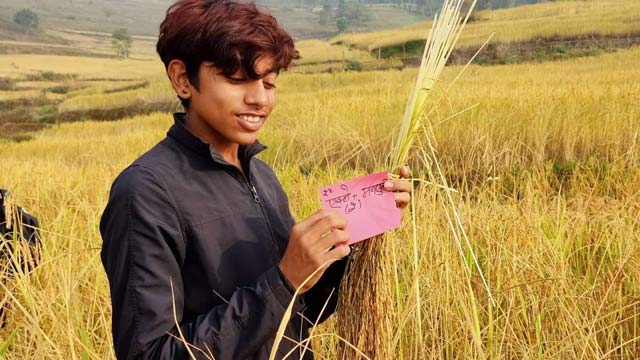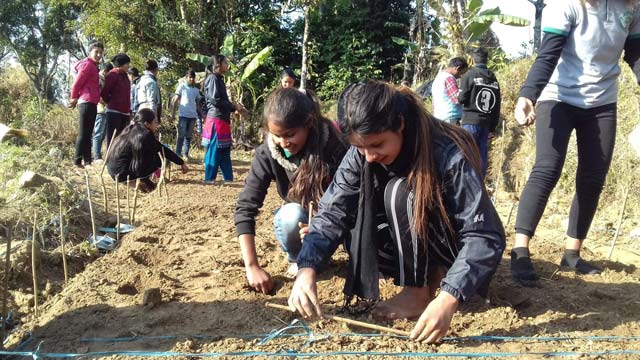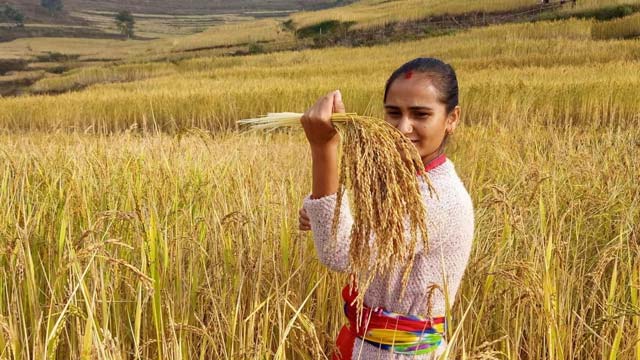When Elevate Nepal founders Anthony Mancini and Dan Maurer first traveled to Nepal, they found themselves working on a coffee farm in Begnas Tal, a fishing and agricultural community near Pokhara.
On the banks of a sparkling freshwater lake, the Begnas village is known for scenic mountain views, a thriving fish market and abundant coffee fields. Craggy peaks, including Manaslu, Annapurna II, Annapurna III and IV as well as Mt. Macchapuchhre, rise dramatically on the horizon. It’s a beautiful place to learn more about growing coffee — a popular Nepalese commodity that’s gaining international recognition.

Leading the coffee farm was Surya Adhikari, a community leader and coffee-growing expert. Anthony and Dan got to see firsthand how he lived, worked and empowered his entire village with his expertise. The three developed a close, family-like bond; Anthony and Dan realized the vast compounding benefits that small, sustainable farms offered to communities, including giving workers technical skills and a reliable source of income.
Upon leaving the farm, Adhikari left the two travelers with a single request:
“Help others understand the importance of educating the next generation about agriculture.”
Under Adhikari’s leadership and guidance, the Ananda Jyoti Agriculture School opened in Begnas Tal in 2019. Teaching the importance of sustainable, organic agriculture to young Nepalese people, the school offers transferable skills and invaluable knowledge. Graduates leave with a deeper understanding of agricultural economics and Nepal’s role in the global market. The school is funded with donations and student tuition; Elevate Nepal began subsidizing the teacher salaries to help the school grow.
Quick Facts About the Ananda Jyoti Agriculture School
- Focus on sustainability and organic growing practices
- 38 graduates as of 2020; 8 received agricultural job offers in Nepal
- Opened a science laboratory to conduct experiments, analyze data and gain a better understanding of the physical concepts of agriculture
- Acquired land to perform students’ practical assessment
- Eligible for funding from the Ministry of Education in 2022

The Impacts of Outmigration on Nepal’s Rural Villages
As a young person living in rural Nepal, the economic opportunities outside of their villages or even the country’s borders are tempting and sometimes necessary for survival.
Nepal has witnessed young people leaving the country in droves for employment in India, China or the Middle East. In fact, income generated abroad through remittance work contributes to a third of Nepal’s GDP. The decentralization of passport services, national policies encouraging labor migration, natural disasters (such as the 2015 Gorkha earthquake) and the oil-fueled boom in construction in Persian Gulf countries have all accelerated Nepal’s outmigration.
Although remittance may lead to short-lived economic stability for individuals, it can have long-term negative impacts on communities, particularly those in rural Nepal. As research has found, outmigration contributes to Nepal’s dependence on foreign nations as well as exacerbating social inequalities.
- Outmigration is highly gendered. Men dominate Nepal’s migration patterns; according to the 2011 census, around 87% of international migrants are men. Women are left to bear childcare, fieldwork and other responsibilities, which also impacts their economic decision-making capabilities.
- Migrants report poor working conditions outside of Nepal. According to the International Labor Organization, recruitment processes and working conditions for Nepalese migrants reveal indicators of abuse and exploitation including forced labor and trafficking.
- It both alleviates and exacerbates food insecurity. A paper published in 2019 in Food Security found migration may benefit households by covering basic expenses, but it simultaneously hampers the country’s agricultural productivity, leading to long-term issues.
- Agricultural land is frequently abandoned or underutilized. A 2019 case study in the middle hills region of Nepal found the decline of the nation’s agricultural output may lead to increased food insecurity as well as land degradation, wildfires, a reduction in biodiversity and the expansion of invasive species.
Nurturing Nepal’s Next Generation of Agricultural Experts

Nepalese villages — similar to Begnas Tal — are emptying as younger generations seek opportunities elsewhere. This increases villages’ dependence on outside sources for food and wage income. Farming as a livelihood may become a thing of the distant past.
Rural Nepal is at a turning point and with the additional challenges of climate change, there must be more opportunities for younger generations to support themselves and their communities in the years to come. We believe strengthening the rural agricultural sector, therefore providing a sustainable income source for villagers, can help develop Nepal in a positive and responsible way. The Ananda Jyoti Agriculture School hopes to support this vision in encouraging young people to educate their neighbors and build self-sufficient, resilient and thriving communities.
We plan to expand the school in 2021, purchasing additional land to give more students practical experience as well as improving technology infrastructure for hybrid and remote learning. We’re eager to offer programming to students outside of Begnas Tal and establish a scholarship program for incoming students.
Learn more about the Ananda Jyoti Agriculture School here.


